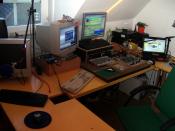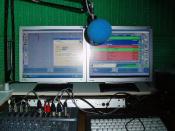The Future of Radio Broadcasting Internet technologies have presented newspaper publishers with many opportunities "" some of them already passed by, and some still to be grabbed. Being the leading news and information source on the Web has largely been lost (to Yahoo!, America Online, etc.), many would say, when early on newspapers had a chance for that position.
But there are still opportunities for newspapers to dominate content within the wireless Internet space, publishing to next-generation mobile phones and portable wireless devices. And, there may be an opportunity for newspaper publishers to get into the Internet radio business and steal away listeners and advertisers from local radio stations.
Indeed, the local-market radio business would appear to be an easy target for some serious competition, because that industry has been slow to react to coming competition from Internet radio. Newspapers moving into the local Internet radio space, should they take it seriously, could significantly damage local radio stations in several years.
National Internet radio Internet radio as we know it today isn't a huge threat to local radio. The typical Web radio network follows the "jukebox" model, offering dozens of musical genres ("channels") for PC users to listen to "" interspersed with a minimal amount of audio advertising (typically much less than on commercial broadcast radio stations). Typical of this model are NetRadio.com and Spinner.com, each of which offer 120 musical channels. Users select a channel and hear streaming audio over the Web.
There are some compelling characteristics to this kind of Internet radio, especially the low content-to-ad ratio in comparison to commercial radio. Because of the growing ubiquity of Internet access, especially in office buildings where workers typically have high-bandwidth network connections, the PC increasingly replaces the desktop radio for playing background music during office hours. Many office buildings...


